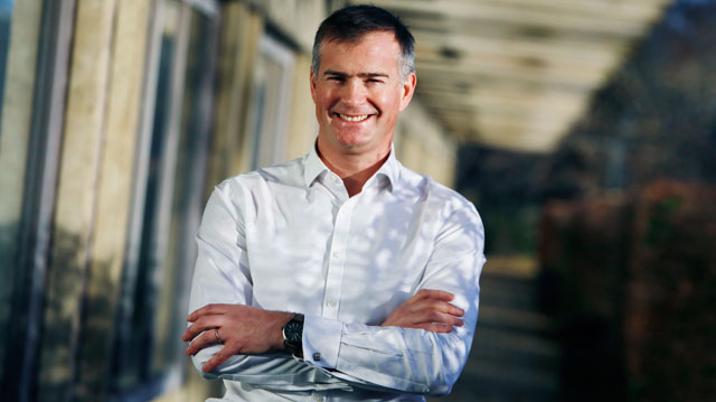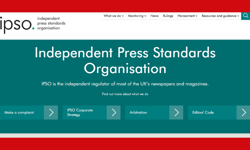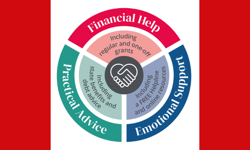
Henry Faure Walker, chief executive of Newsquest Media, can hardly avoid reading The Journalist, the magazine of the National Union of Journalists becomes it comes through his letterbox at home.
As a fully paid-up member of the NUJ, his wife Henrietta McMicking, a freelance journalist who used to work for BBC Scotland, automatically receives the publication.
“Usually it’s saying nasty things about me. I keep it from the children,” says Faure Walker, who in common with most local and regional newspaper executives has had to cut jobs to reflect declining advertising revenues.
Newsquest was the main story in the current Journalist issue under the headline: “Anger over Newsquest pay sparks strike in Cumbria.”
A one-day strike took place on December 20th amid accusations from NUJ spokesmen that Newsquest appeared to have a business model “based primarily on cost-cutting”.
About 100 jobs have been lost since Newsquest took over Cumbrian Newspapers (CN) in March but the main complaint of the journalists was the lack of any pay rise since 2015.
Faure Walker, talking before the strike, is uncomplaining about the things said about him and believes it simply goes with the territory.
“What we are trying to do, because it is good for our business, our shareholders and our communities, is find a model for local news and local news brands in a very difficult landscape,” says Faure Walker who has been chief executive of Newsquest for nearly five years.
Because of current economic pressures and the revenue decline in the local newspaper business, restructuring, he argues, has been inevitable and that, equally inevitably, has meant job losses “and some human cost and pain”.
Long-term commitment
Newsquest, owned by Gannett of the US, is in the newspaper business for the long-term and wants to have a business in three, five or ten years and Faure Walker says he “wants to be working in that business”.
The company is not like private equity groups, he notes, buying, cutting and then selling in three years.
“We have not sold newspapers, we are not flipping newspapers so we live with the consequences of our actions,” the Newsquest chief executive insists.
The company looks hard and long at the effect of restructuring on the product but, sometimes, Faure Walker argues you have to restructure simply to keep a news brand in business.
“I’d rather have a news brand still going in the market doing local journalism, even with less editorial resource, rather than having nothing at all. It’s better for the community and obviously better for some journalists,” Faure Walker believes.
The Newsquest chief executive emphasises just how tough the local newspaper business is at the moment, and although display advertising is holding up better than classified, and weekly papers better than dailies, he doesn’t see any let-up in the decline of print advertising either this year or beyond.
“I wouldn’t forecast the end of print but clearly more print newspapers are going to close but I can see our weekly newspapers being there in the long-term though I would be a fool to forecast how long that is – as far as you look out,” says Faure Walker who joined the newspaper industry in 2002 as business development manager of Johnston Press.
In 2017, Newsquest was sufficiently optimistic about print to launch, or re-launch, ten small local papers which have done “OK” and seven of them have survived.
There is no great wave of new print launches and the approach is opportunistic. There were only three launches last year.
“Where we see gaps in the market that have opened up because titles have closed, or to some extent readers’ habits have changed, or we have reformatted how we distributed a newspaper, that can be quite interesting for us but it would be wrong to call that a wide trend,” says Faure Walker who after university in Durham did an MBA at the famous French business school INSEAD.
The closure of the Oldham Chronicle in 2017 provides a telling example of that opportunism. Newsquest was able to launch the weekly Oldham Times a week after the Chronicle’s closure after 163 years because it could call on its existing infrastructure.
Newsquest is also expecting significant growth at its 28, mainly free, regional consumer magazines under the Living brand.
Digital opportunities
But, unsurprisingly, the former digital director of Johnston spends a lot of his time thinking about digital and is optimistic about the prospects for growth.
“News publishers are increasingly getting to grips with how to monetise digital and while there is not necessarily a silver bullet, they are getting better at it year by year. We are optimistic about the digital growth we expect to see this year and beyond,” Faure Walker says.
The 1XL marketing joint venture giving access to more than 800 titles around the UK is going well and Newsquest has recently launched LOCALiQ, a business-to-business brand designed to speed up its push into digital marketing services.
Faure Walker estimates that small and medium businesses spend around £7 billion a year on digital marketing with probably around half of that going to Facebook and Google.
Regional publishers probably get only a tenth of the total at the moment.
With the help of Gannett-owned marketing company ReachLocal and LOCALiQ, Faure Walker hopes to raise revenues of £10 million this year from digital marketing services, a new revenue stream for the company that will account for nearly 5 per cent of Newsquest turnover.
His main frustration is that local publishers such as Newsquest can achieve 75 per cent digital coverage of their local areas – excluding print – compared with around 50 per cent of the whole of the UK for Facebook.
Yet traditional publishers are still “getting crumbs off the table” compared to the billions going to Facebook and Google.
Faure Walker is also irritated by some of the most illustrious marketing directors of the biggest advertisers such as Keith Weed of Unilever, who stepped down in December making speeches saying the behaviour of social media giants such as Facebook was unacceptable.
“We wrote to him. He didn’t respond. Great speeches are made and nothing changes. I would call it shallow. We just have to work harder at it,” Faure Walker admits.
He detects a certain snobbishness on the part of the London-based ad agencies against traditional news brands.
Despite their enormous reach, “maybe they think we are boring and old fashioned”.
Cairncross review
By far the biggest thing on the mind of the Newsquest chief executive right now, is and will remain, how to fund and sustain quality journalism in the UK – the main topic of the review ordered by Government and led by Dame Frances Cairncross.
“We need to have a grown-up conversation about recognising the importance of good quality local journalism to society, to democracy and about how we support that,” says Faure Walker.
His ideas can be grouped together under a concept of public-private partnerships.
One would be an extension of the Local Democracy Reporter scheme whereby 150 journalists funded by the BBC – Newsquest has 40 of them – have improved coverage of courts and councils. One of the Newsquest LDR reporters, Emily Lloyd, has just been appointed editor of the Shropshire series of Newsquest papers.
Faure Walker would like to see the scheme extended to 1,500 journalists, which he says would only amount to 1.5 per cent of the BBC’s licence fee.
All the money, he insists, would not go to profits but journalism.
The Newsquest executive sees no difference between tendering to provide a journalistic service and independent television production companies tendering to produce a drama or reality TV series for the BBC or Channel 4.
“Journalism is becoming an increasingly unprofitable activity so you need to incentivise publishers to do journalism,” explains Faure Walker who adds that it’s important to get across the message that it would be in everyone’s interest to leverage the existing, efficient publishing infrastructure.
The second arm of his strategy for the future funding of journalism would come from the social media giants – far beyond the £4.5 million that Facebook has agreed to contribute to funding community reporters.
“The logical funding sources for that (journalism initiatives) would be the tech giants who benefit hugely by free-riding on the news we create and I think they should return some more equitable recompense and contribute to a public-private scheme,” he argues.
Faure Walker hopes that Cairncross will be bold and will make recommendations for financial support for quality local journalism.
“I remain optimistic. It’s a very tough business but it’s moving fast. There is a lot of change and with change comes opportunity,” the executive insists.
Just how tough the industry can be became all too clear when Johnston Press went into administration in November dragged down by debts of £220 million taken on in a previous acquisition spree. It is now controlled by its bond-holders.
Faure Walker, the former Johnston Press digital director chooses his words carefully in discussing what happened at the owners of The Scotsman.
“They bought businesses in 2005 at the peak of the market for high prices. The board of Johnston Press was too focussed on newspaper acquisitions and not savvy enough when it came to digital. That’s just a fact,” says Faure Walker.
(This author took part in a ‘guess Johnston’s future profit margin’ game at a management conference soon after the acquisitions. At the time, the margin was 36 per cent. The management was shocked to be told that it could drop to 20 per cent because the internet would end local newspapers’ classified advertising monopoly.)
That is history.
What Henry Faure Walker, chief executive of Newsquest, most wants now for the future is: “a meaningful, positive outcome from the Cairncross Review and that Cairncross recommendations will lead to concrete action by the end of the year that meaningfully supports local journalism in a public-private partnership.”










